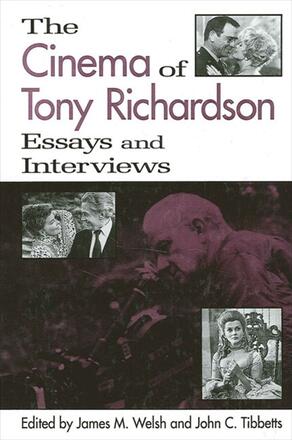
The Cinema of Tony Richardson
Essays and Interviews
Critically surveys the films of Tony Richardson, one of Britain’s most inventive directors of stage and screen.
Description
The Cinema of Tony Richardson examines for the first time the stage and screen achievements of Academy Award¬–winning director Tony Richardson, and includes recent interviews with his colleagues as well as a complete bibliography and filmography of his work.
An important cultural trend-setter both in Britain and America, Richardson is here given his due as an influential and inventive film director who specialized in literary adaptations and worked constantly in theatre, film, and television production. Richardson (1928–1991) worked with George Devine at the Royal Court Theatre during the 1950s where he revolutionized British theater through his productions of John Osborne's plays Look Back in Anger (1956) and The Entertainer (1957). Both plays were then adapted to the cinema, launching Richardson's career as a feature film director. Richardson and Osborne later founded Windfall Film Productions, Ltd. to extend the concerns of "kitchen sink" realism from stage to screen and to make films that display the reality of British life. The Osborne projects were followed by screen adaptations of Shelagh Delaney's A Taste of Honey (1961) and Alan Sillitoe's The Loneliness of the Long Distance Runner (1962), which became benchmark films for the British New Wave. Richardson went on to a distinguished career in Hollywood as a result of his Academy Award–winning 1963 adaptation of Henry Fielding's satiric novel Tom Jones.
[Contributors include Kevin Brownlow, Linda Costanzo Cahir, Jocelyn Herbert, Robert Holtzclaw, William L. Horne, Edward T. Jones, Paul Meier, Kenneth S. Nolley, Rebecca M. Pauly, Gene D. Phillips, S.J., Karel Reisz, Judith Bailey Slagle, John C. Tibbetts, and James M. Welsh.]
James M. Welsh is Professor of English at Salisbury State University. He is the author of Peter Watkins: A Guide to References and Resources and the editor of Literature/Film Quarterly. John C. Tibbetts is Assistant Professor of Theatre and Film at the University of Kansas. He is the author of The American Theatrical Film: Stages in Development. Welsh and Tibbets are also coeditors of The Encyclopedia of Novels into Film.
Reviews
"The Cinema of Tony Richardson provides a rounded portrait of a major English-language filmmaker who has been neglected by film historians. The book demonstrates that Richardson had a varied and interesting career—touching on the 'angry young man' period of British drama; the New Cinema of the 1960s; the French cultural icons Jean Genet, Jeanne Moreau, and Marguerite Duras; and evolving relationships among film, theater, and the novel." — Peter Lev, Towson University